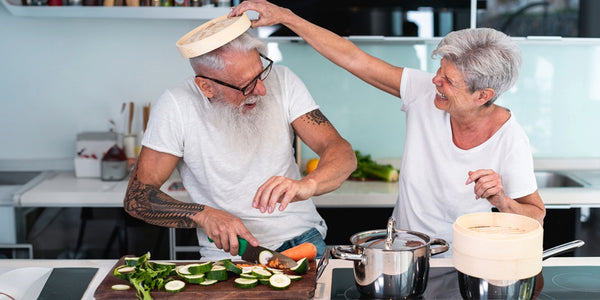Your Cart is Empty
Injury
While aging does come with its challenges, many people have unrealistic ideas about life as an older adult. Stereotypes and misinformation are common, making it harder than ever to find trustworthy information. You may already be aware of the most common myths about aging, though there are probably many commonly-spread myths that have flown under your radar. Take a look at some of these aging myths to keep yourself informed.
There may be no end to the aging myths that have been spread online and by word of mouth. However, by starting with these common aging myths, you can stay ahead of the curve and ensure you’re getting trustworthy information.
In some cases, older adults find themselves with fewer friends and family members close at hand, making them susceptible to long-term feelings of depression. While not uncommon, it’s important to remember that there’s nothing normal about pervasive feelings of sadness, especially if they’re impacting your quality of life.
If you are an older adult who feels depressed, the key is to seek help, rather than just passively accept your depression. By talking to a doctor or mental health professional, you can better understand the range of mental health solutions that are available.
Just like anyone, there’s a variety of reasons older adults have trouble sleeping, including medical conditions and chronic pain. However, just because they have a harder time getting a good night’s rest, doesn’t mean their sleep needs have decreased. Older adults need the same amount of sleep as anyone else–between 7 and 9 hours each night. Failing to get enough sleep can impact your mental health, and increase your risk of falls.
Looking for more tips to help you sleep better as you age? Check out our complete guide.
In some cases, old age means can mean cognitive decline, however, the reality is much more complex. Old age often comes with experience, what neurologists sometimes call crystallized intelligence, which can be just as valuable a resource as processing speed.
It’s also important to remember that staying mentally active can help keep your mind flexible. By trying to master new skills, you can retain and improve cognitive abilities. This can mean practicing a craft, picking up a sport, gardening, socializing, reading, or anything else that activates your brain.
If you need new ways to stay active, take a look at our list of activities for older adults.
While the risk of dementia tends to increase with age, dementia is not a normal part of aging. It’s not uncommon to live well into your 90s without any decline in cognitive function. Don’t forget that mild forgetfulness or absentmindedness are not the same as dementia. If you do think you are suffering from chronic cognitive impairment, talk to your doctor.
It’s commonly believed among seniors that physical exercise does more harm than good, especially when suffering from a chronic condition. In reality, inactivity often plays a greater role in a senior’s loss of mobility. Even when recovering from a chronic condition, it’s important to stay active.
The key is tailoring your physical activity to your needs and limitations. Low-impact exercises like yoga and tai chi can be great ways for anyone to boost physical fitness. Regular physical activity can speed recovery, help retain mobility, improve stability and balance, and help you maintain independence.
Family history plays a role in susceptibility to Alzheimer’s, but the fact is researchers still don’t fully understand the disease. In reality, a wide range of factors impact your likelihood of contracting the disease. Factors like genetics, exercise, diet, and exposure to pollutants can all affect your risk. If you’re interested in learning more, get in touch with your doctor. You can also check out our complete guide to Alzheimer’s.
Like many of the other myths mentioned above, there is some truth to this one. Older adults sometimes do have to give up driving, due to vision impairment, decline in cognitive functioning, or other issues. However, it’s also worth noting that the percentage of older adults who continue to drive into their 60s, 70s, and 80s is growing. In fact, since 1997, the percentage of licensed drivers over 70 years old rose from 73 percent to 87 percent. While you may have to give up your license eventually, it may not be as soon as you think!
Loneliness is a serious issue for older adults, leading to lasting mental and physical health conditions that can worsen the quality of life. However, it’s important to remember that building a strong social network is achievable for anyone. With a bit of time and the right resources, older adults can get the social support they need.
This is especially true today, as internet usage becomes more and more accessible to seniors. As long as you have a bit of tech-savvy, you can connect to new friends all across the world. If you’re looking for an in-person friendship, you can use websites like Meetup.com to talk face-to-face with people who have similar interests and hobbies.
As humans, we crave connection and that doesn’t change as we age. These relationships are important and help harvest healthy physical and emotional well-being.
Regardless of age, a lifestyle that includes healthy eating habits and regular physical activity is important for maintaining a healthy weight and muscle mass.
Seniors today have more resources than ever before when it comes to staying informed about the physical, mental, social, and emotional aspects of aging. However, it’s important to remember that there’s a lot of misinformation out there too. Learning to separate fact from fiction is the best place to start when learning about the aging process. Don’t forget–when in doubt, talk to your doctor or a mental health professional who can help fill in the blanks.

![The Benefits of Flexibility [A.K.A. The Secret Sauce for Aging]](http://www.vivehealth.com/cdn/shop/articles/Smiling-retired-woman-listening-to-music-while-stretching-legs-outdoors._600x.jpg?v=1713090677)

